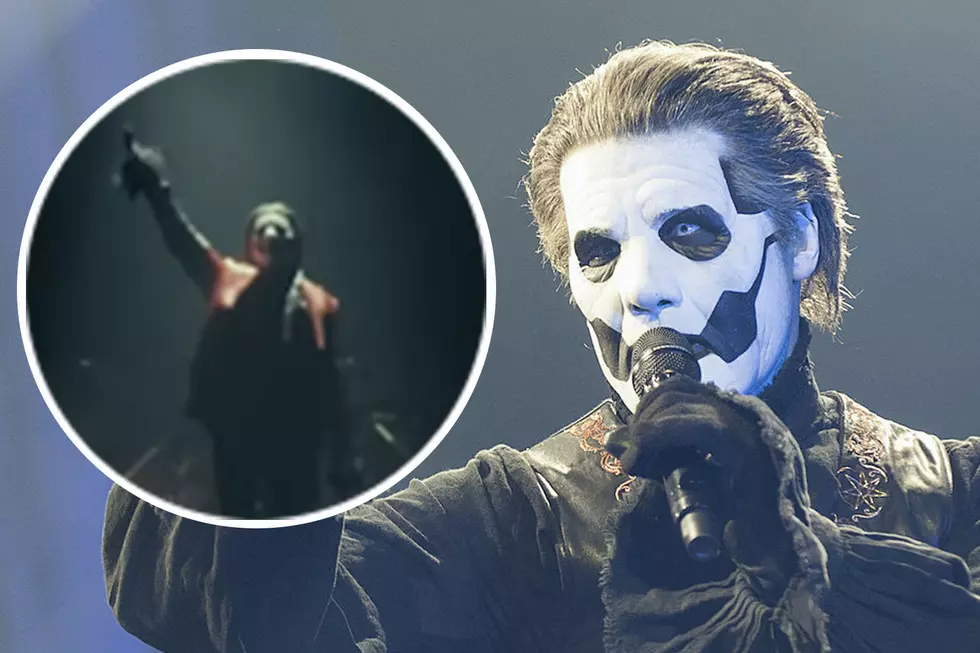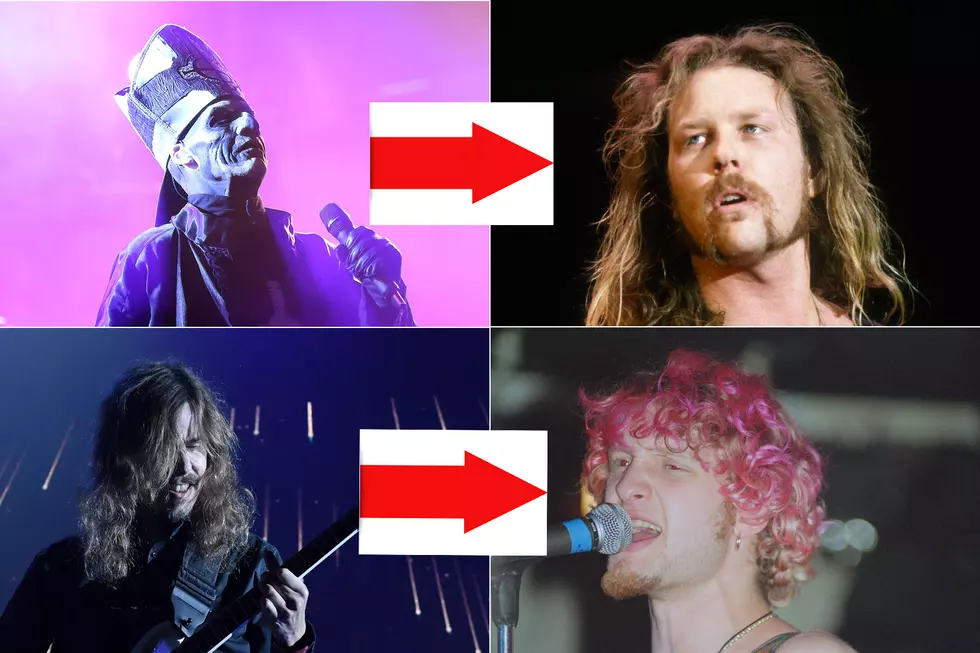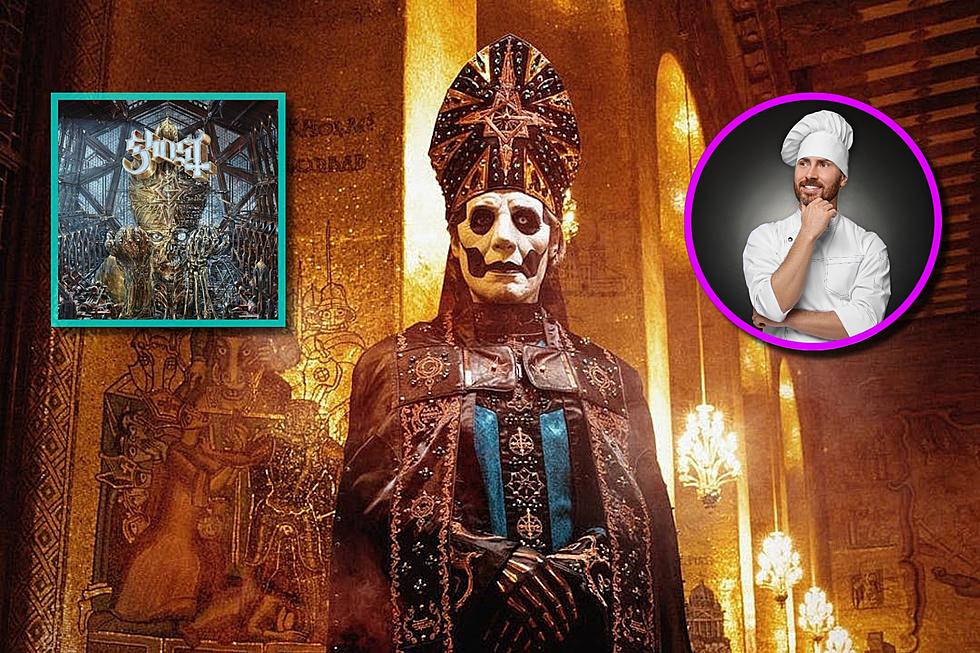
A Nameless Ghoul From Ghost on ‘Meliora,’ Capturing Religiosity + Possible Classical Album
We recently caught up with one of the nameless ghouls of Ghost. Having heard the entirety of the band's third studio album, Meliora, we certainly had a lot of questions about the new book of psalms from our favorite Swedish Satanists.
We've already shared our chats with the nameless ghoul about Ghost no longer having to use 'B.C.' in their name and the masked figure pondering about a potential identity reveal in the future. Now, we give you the rest of our exclusive interview where the ghoul gets deep into Meliora, how Ghost uses organized religion's tactics within the band's own music, the possibility of a classical-based album and more!
I recently attended a catholic funeral and the service, it was completely focused on God the entire time with these dramatic rituals and musical interludes throughout the whole thing. In a lot of ways, the progression of the album and its feel was exactly the way that funeral felt to me. Was this in any way the goal of Meliora?
I think that part of organized religion, as any other institution, they have a niche or a schtick that they're using. In the Church's case, it's very much based on a dramaturgy and a rhythm that falls naturally into the solum and holy departments in our minds, which is not to be underestimated in any way. The whole idea of people in a room, ideally thinking about the same thing, focusing on the same thing and agreeing silently, to worship and that the spirits in the room are holy and there's someone watching over; it does definitely have an impact. That sort of drama is pretty much exactly what we are trying to mimic. Not only for the commercial value, but because it is a very powerful way of people communicating and socializing.
At the end of the day, it's kind of like Scientology in a sense. What [L. Ron] Hubbard came up with was a way for a person to have a mental orgasm. The smart move he did was that he understood that if he could make people have that again, then he'd be a rich man. Basically that's what Scientology is about. In the end, it's still something that is orchestrated by people in order to get other people to do what they want. That is in essence what we do too. We're summoning people into a room and we're orchestrating a ritual in which X amount of people agree upon worshiping us and we in turn tell everyone what to do and how to feel. Everything is orchestrated in ritual in smell and sound and all of that. As I was saying, I would never diminish that in saying it's just motive. In the context of when people agree on things, what is real? It's real at that point.
To answer your question, yes, we are definitely influenced by the whole concept of people in groups, devoting themselves and throwing themselves into the idea of something external and holy. It's very interesting.
That's what I've always loved about Ghost. It has used these musical characteristics of the Church to recruit your own followers. It's very uplifting and warm, but then you guys are very sinister in your undertones, which I have always loved. And fittingly, you've gathered your own large cult following. I think Meliora, it uses those religious characteristics better than the previous two records. In using those characteristics on the record, can you tell me about the way that you approached it?
Very early on when we decided that this was going to be a band and we noticed that maybe there's a possibility that we might make a record, if we made one record, maybe we might make more. We are a little bit by default, a so-called occult rock band with an image. Since most bands that are sort of moving within the realm of occult or the darker ways of rock music, it naturally gravitates towards some sort of medieval or gothic symbolism. You very easily end up in the church and cemetery, wooden forest or earthy atmosphere. I definitely love that. I worship films, music and art that takes place in that milieu.
I love unexplained fog that is, for some f---ing reason, red in a forrest that just comes out of nowhere. That whole 'Evil Dead' forest, which is fantastic. You're never really in that forest, you're always in the comfort of your own room where you can listen to death metal and watch films like that. It's a very youthful approach. We knew that if we're going to be this gimmicky band and have a little 'Eddie' singing and we're going to have a Church, we definitely need to revamp this every now and then. Also, because there was an interest in how many shapes and forms you can make this change in a way you still stay on the carpet in terms of the Liturgy. So we knew at one point or another, we had to make a futuristic album speaking more about where the Church symbolism might be borderline more of a corporate masonic sort of thing, albeit being more of a church than the Masonic but where it's not very medieval or wooden anymore.
The whole album was written and intended to be very futuristic, very metropolitan and urban. Just a post from the classic goth thing; more suburban and rural and more being lush and overgrown cemeteries, spiderwebs, all of that. We were trying to take this thing to a very clean, indoors, 67th floor in a very high building, in a very big city. Those were the pictures we hung on the walls of our minds in order to know where we were going. We are all very conceptual because we know a little bit on where we want to go the next time. There's a few things we couldn't focus on, because we knew we had to keep a few things and maybe next time we'll go super wooden, super earthy or medieval. But in order to make that theme interesting, it's better to just take it out and throw it into another century. Also, this record is a little bit more, I think, and I'm not sure if people have noticed, but there's always been some what of a social common theme on the first album and in the second it became a bit more clear. It dealt very much with the man's relationship with the Devil, whereas this record is more about the absent God and how mankind reacts to a deity absence. Where in this case, the Church of Ghost is the only holy institution in this world.
What you don't know, what you can't see yet, is on the LP there's a lot of detail. There's the big high building in the middle and then you see the three church windows on the stomach of Papa. When we do our show later on our headlining tour, that is the room that we are in and that is where the chapel is located. High up above in the height of the city, surrounded by these towers of Babel, reaching for the top.
I've seen you three times here in New York and each time the show felt bigger, it's been more conceptualized. Besides what you just told me, will you guys be taking it to a new level?
We are definitely trying to step it up this time in terms of production. There is always a growing pain. I think that most bands experience that. It might not be very apparent for bands that have just a big drum kit in the middle and a wall of Marshall amps on each side of the drum kit because when you have your T-shirts and your beards, it doesn't really matter what kind of stuff you have around of you. Whereas we've always been very keen on having theatrics and so far what we've done to date is definitely very little of the things we have on the list that we want to do in the future as we grow bigger. As long as you're not headlining Madison Square Gardens everywhere, there's always a little risk that everybody in New York and Pittsburgh and Detroit, Montreal, Boston will see this whole thing and then all of a sudden we come to some other place and it's, whoops - half of that. All of a sudden you can't do the big theatrical thing, unfortunately. As I said, it's a growing pain. Fortunately we don't rely totally on the theatrics, it usually works quite well without the big scenery too because we're also entertaining the people. It's not just the big screen in the back that you're supposed to look at. But definitely the intention is to step it up and I think most people will understand that when we start our U.S. tour.
I would kill to see Ghost play somewhere like St. Patrick's Cathedral or do a tour of giant churches that happen to be around the United States and around the world. Is that on your list of things you'd like to do?
[Laughs] Ironically, no. Not to break your enthusiasm, but it is something we get asked every now and then and it's very impractical for different reasons. The acoustics, unless you're playing choir music or string quartet music, are horrible in there. People would demand their money back immediately.
Secondly, I am a very much a fan, from a cultural and historical point of view, of churches. I'm very much against any sort of violation against them. It's an enormous legacy that's given to us in terms of understanding our past. Some people may think it seems weird but I'm very much a preserver of ancient religiosity. Let's put it that way. As much as I want to be a part of that scene, and it'd be fantastic if we could turn all that negativity into something very positive, I right now am probably a little bit too practical that I understand that it's going to be such a problematic thing. But, I would say that there are definitely some churches that are better equipped and if you just want to do something… I'm automatically going into practical in some sort of unsexy way of talking about it, but if you can turn it into some filmed special event or something like that, then why not?
Usually we're carrying with us our own church backdrop in order to make it look like a church. Sometimes you actually play in venues that are old, converted churches. Like more square churches, not an old stone thing. Just a building where we sort of have to cover up the church things where they don't fit into the concept. Especially now because this new version we have, it's supposed to look like if there was a Satanic Chapel at the top of the Empire State Building; that's how it looks. So it wouldn't work if if we take all that stuff into a gothic or renaissance church.
Would Ghost ever want to work with a group like the Prague Philharmonic, who do amazing work with rock and metal bands, to create the biggest sounding music possible?
To answer your question, yes. The only reason we really haven't taken that step is because the loss of gravity, we haven't gotten there yet. We definitely saved a lot of ideas, even songs that sort of asked for there to be actual strings. We chose it on this record a little bit like we did on the last record, but we had a lot of problems with it at that point, but now we chose to put the money in the choir because we felt this is a futuristic album. There are a lot of mellotron choirs on there because we wanted it to feel little bit synthetic and simulated. The choir symbolizes the gothic element that comes in all of a sudden. In some films, all of a sudden there's a choir coming to narrate the lead role, basically. The album ends with a very sort of church-like choir. That is meant as a return to the original source.
In the future, there are definitely ideas, not only for a rock music, but also for music that might actually be leaning more towards actual classical music where we might not even play guitar and drums, and just have classical elements. I don't know if you're familiar with Italian prog music but there were a lot of Italian prog bands in the '70s that all of a sudden there was a classical music song and that broke into a piano song with vocals and then it became a rock song and then all of a sudden was a string quartet that played "Eleanor Rigby" style. That's definitely in there but we chose not to play that card this time, because we knew we would do that half assed. It's better just to save that for the medieval album and then we'll do it full on. But ironically, yeah, the Prague Philharmonic is definitely the go-to one.
Thanks to the nameless ghoul for speaking with us. Meliora comes out on Aug. 21. To pre-order the album, click here.
100 Metal Facts You May Not Know
More From Loudwire









